#Development of volunteering and promotion of patriotic education as tasks of civil society
An important indicator of civic activity and people's desire to participate in joint projects is the development of volunteering, i.e. selfless individual or collective activity for socially useful purposes for the benefit of other people or society as a whole.
In this area, we are witnessing a radical change in social stereotypes. If in 2013 only 3% of Russians considered themselves as volunteers, to date, after only six years, already 17% of Russians say that they are volunteers, and one in three has experience in volunteering. Almost the entire population of this country approves of volunteering – 88%. In 2018 Russia celebrated The Year of Volunteer that allowed the volunteer movement to consolidate its status at the state level and involve even more citizens. To date volunteering organizations actively interact with federal and regional authorities.
The end of 2018 is marked by the adoption of the Concept of promoting the development of volunteering in the Russian Federation until 2025 and the summer of 2019, is marked by the approval of the action plan for implementing the Concept of promoting the development of volunteering in the Russian Federation until 2025, as well as an action plan to promote volunteering activities of socially oriented non-profit organizations (SO NPOs) and charity.72
The Civic Chamber played an active role in the development and discussion of the document, primarily acting on the basis of the Volunteer Coordination Council under the Civic Chamber. Most of the proposals of the Civic Chamber were taken into account.
The document defines 95 steps (points) for the analysis and removal of barriers that hinder the activities of volunteering, the launch of educational programs and programs to support industry-volunteering in healthcare, social care, culture, ecology, and other areas. During the discussions, representatives of the volunteer community stated that all was not well with the admission of volunteers to various organizations, and the achievement of mutual understanding between the administration of various social institutions and volunteers. The key to solve this issue is the development of methodological recommendations and standard documents for employees of state institutions so that they understand how to build interaction with volunteers.
Another measure of supporting volunteering in the Civic Chamber of the Russian Federation is the contest “Volunteer of Russia – 2019”, the application campaign ended on June 30. The main volunteering event received a record number of applications – 28 144 projects from activists from all over the country. This year the grant fund of the competition is 45 million rubles.
The regions demonstrate not only the increase of interest in volunteering, but the development of volunteering resource centers, the most popular services of which are financial support, training, information support in the mass media and the Internet, and the sharing of premises for volunteers.73
Our country is being done a great deal of work to develop international volunteering. For example rescue-volunteers are involved in supporting rescue and humanitarian operations abroad. They face such a serious problem of an urgent visa. Volunteers need to arrive at the emergency scene as soon as possible. The Civic Chamber considers it necessary to establish mechanisms for obtaining visas for rescue-volunteers and to regulate the legislative framework of this matter. Russian volunteer organizations require legal support to avoid preoccupation to fall under the status of NPO as foreign agent. The Civic Chamber proposes to increase the duration of Russian visas for foreign volunteers working in Russia for 1 year. Such people, voluntarily helping and free helping Russian citizens, can apply for benefits in obtaining Russian citizenship.
Do you know about the activities of resource centers for NPOs in your region?
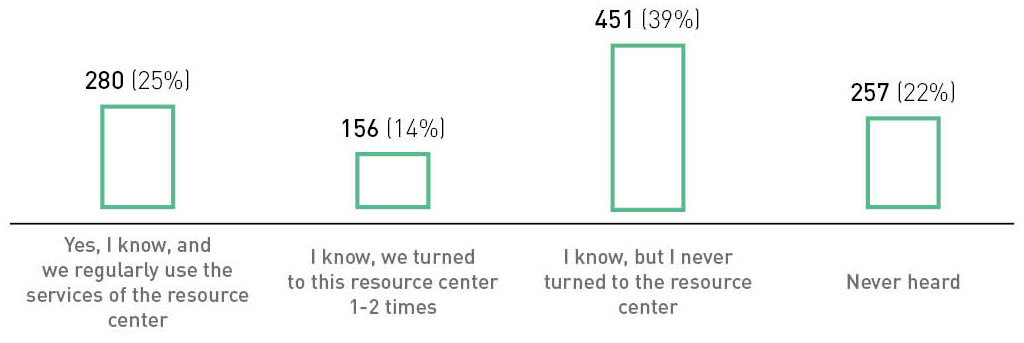
Source: The Civic Chamber of the Russian Federation74
Information on the awareness of the participants of the "Community" forum about the activities of resource centers75
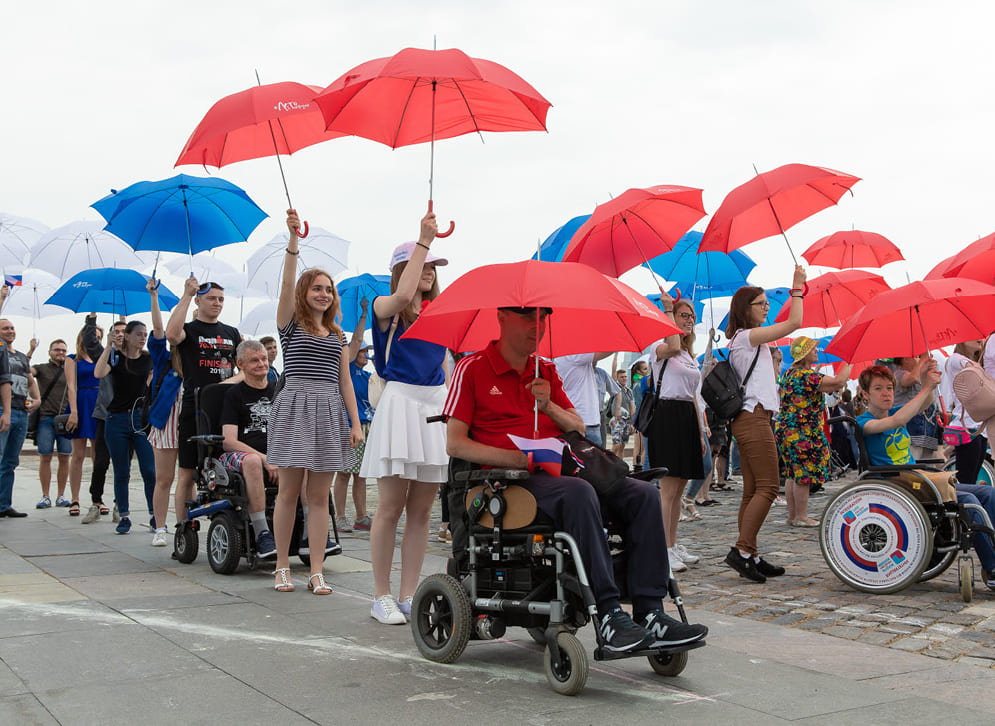
Corporate volunteering is one of the forms of business participation in solving social problems, including those aimed at reducing inequality in society. This sphere is quite diverse. Companies can work with a specific fund or participate in individual charity events; charity races and marathons, which are now popular, also constitute a form of corporate volunteering. Volunteering is the participation of company employees in educational work and targeted assistance to those in need. To date, this area is developed mainly in large enterprises, but there is a potential in small and medium-sized companies. An important area of work of the Civic Chamber in this area is the development of the Corporate Volunteering Standard76, which is designed to help volunteers for small and medium-sized enterprises. This is a kind of "menu" of the measures that a company can take to for successful implementation of corporate volunteering.
According to members of the Civic Chamber, patriotic education, along with the development of voluntary practices, remains one of the most important areas of state-public dialog. The Commission of the Civic Chamber of the Russian Federation on Public Diplomacy, Humanitarian Cooperation and Maintenance of Traditional Values conducted a series of surveys that showed that our citizens consider “patriotism as love for the Motherland”, “a sense of duty to oneself, family and the Homeland”, “philanthropy and justice". This distribution correlates with the basis of the system of traditional values embodied in the National Security Strategy of the Russian Federation. And, in fact, it confirms the effectiveness of state policy in this area.
In connection with the deadline for the implementation of the state program “Patriotic Education of Citizens of the Russian Federation for 2016–2020”, approved by Resolution of the Government of the Russian Federation dated December 30, 2015 No. 1493, the Civic Chamber conducted a survey on the implementation of the state policy of patriotic education of citizens in the Russian Federation. The survey showed that the most popular and effective forms of patriotic education are the activities of patriotic centers (clubs), military sports games, festivals and contests of a patriotic orientation, as well as a personal example and meetings with veterans of the Great Patriotic War. To continue effective work on the formation of a patriotic consciousness of citizens, the Civic Chamber proposes to extend the state program for 2021–2025, while ensuring public control on its implementation and appropriate spending of budget funds.
In preparation for the celebration of the Year of Memory and Glory, a special attention was paid to preserve the historical memory of the exploit of the Soviet people, their role in the Victory over fascism, and to countering the falsification of history.
Taking into account the dissemination of examples of distortion of history for the last years by a number of foreign countries, the substitution of basic concepts, the pushing of anti-Russian historical concepts, the relevant commissions of the Civic Chamber of the Russian Federation constantly carry out explanatory work, publish books and brochures, organize round tables with the participation of historians and attracting Russian youth and foreign representatives.
For example, the Civic Chamber of the Russian Federation has published a collection of scientific articles "Munich Betrayal: lessons for the modern world” based on the materials of the conference held by the Chamber. Round table "The evolution of relations with Western allies: from Normandy 1944 to the Cold War", dedicated to the 75th anniversary of the opening of the second front in Western Europe, allowed to bring together historians, political scientists, public figures, and representatives of state institutions. The speakers of the roundtable emphasized that today the targeted policy of a number of Western countries to distort history is obvious. In particular, the landing of the allied forces in Normandy is of great importance, as likely it seems to be the key moment of the Second World War. At the same time, the heroic contribution of the people of the USSR to the capitulation of the fascist military machine is blurring.
The Civic Chamber is implementing the project “Never Expire”.77 It was launched on the platform of the Civic Chamber of the Russian Federation on February 22 at a round table on the topic “Never expire. Problems of studying and preserving the memory of the victims of the genocide of the peoples of the USSR in the temporarily occupied territories during the Great Patriotic War". Moreover, the conference “Never Expire” was held in the city of Veliky Novgorod, and the presentation of the project was held as a part of youth forums in the North-West and Volga Federal Districts.
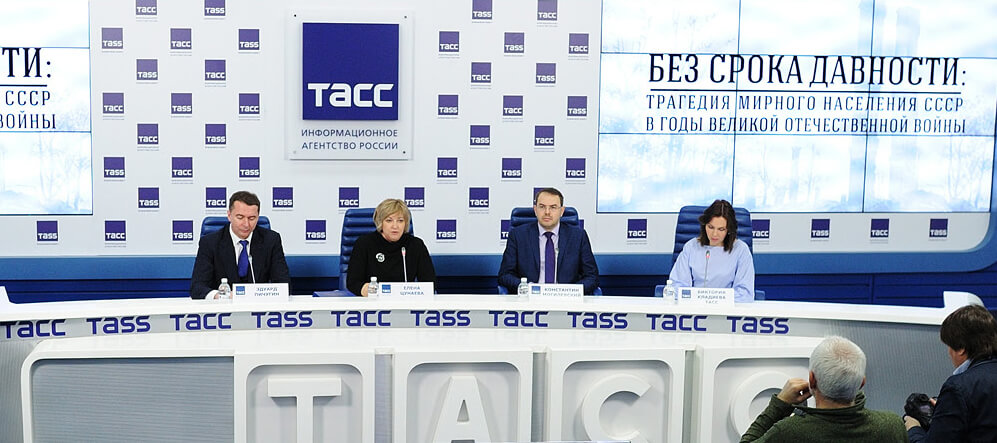
In 2019, the Civic Chamber conducted a study on the situation of veterans who fought in the ranks of the Red Army during the World War II and live in countries with anti-Russian trends in diplomacy and politics.78 European countries and the USA, regardless of their attitude to Russia and foreign policy rhetoric, provide veterans of the Soviet Army who participated in the World War II with a decent standard of living, additional benefits and social protection. In the meantime, the position of veterans in the former republics of the USSR is worse, the attitude to the veterans there varies depending on their attitude to Russia. For example, Ukraine showed facts of mockery of the Victory Day on May 9, and intolerant behavior and physical violence against the veterans. The Baltic countries cling a state policy for the rehabilitation of fascism is being implemented. The veterans do not have any bonuses and benefits, while the "forest brothers", along with the Nazis who fought against the Red Army, receive monthly payments. The situation with the provision of veterans of the Red Army in neighboring countries and attempts to falsify the history of the Second World War are of great concern to Russian civil society and require close attention of the state.
The Civic Chamber of the Russian Federation, regional chambers, together with NPOs of search teams, participated in the development of the federal target program “Creation and Restoration of Military Memorial Objects in 2019–2024”. The federal target program “Immortalizing Those Who Died Protecting the Motherland for 2019–2024” was approved by Resolution of the Government of the Russian Federation of August 9, 2019 No. 1036. The suggestions and comments of the Civic Chamber were taken into account. It should be noted that in practice, the main activities in the field of monitoring the status of monuments and gravesites are conducted by public organizations.
#Measures to develop charity and increase credibility in non-profit organizations
More and more people in Russia take part in volunteering activities; the business is developing its own corporate social responsibility programs, and the importance of partnership between the state and NPOs is growing. According to the monitoring of the state of civil society conducted by the Higher School of Economics, 35% of adult citizens said that they voluntarily, without remuneration, had participated in a socially useful activity over the past year (not to help family members or close relatives). At the same time, 31% of them did this within organizations, and 69% did it on their own.79
Increasing interest in charity must be encouraged and regulated, protecting from fraudsters. To this end, the Ministry of Economic Development, together with the Civic Chamber of the Russian Federation, adopted the Concept of Promoting the Development of Charitable Activities in the Russian Federation until 2025. The implementation of this document should make public support for charitable activities more active, lead to an increase in donations, increase in the effectiveness of charitable programs, and finally improve the quality of life of Russian citizens. As part of the concept, it is planned:
- to simplify the procedure for obtaining tax deductions for citizens who donate to non-profit organizations;
- to strengthen tax incentives for legal entities involved in charitable activities;
- to promote the development of corporate charity and the involvement of NPOs in the development and implementation of social business programs on a competitive basis;
- to expand the list of legal forms which is possible to create charitable organizations;
- to involve participants in charitable activities in various public councils under state authorities and local self-governments, as well as in the development of various regulatory legal acts;
- to amend the Code of Administrative Offenses to combat fraudsters that discredit charity in general.
Anti-Fraud activities are a particularly important issue for the image of charitable activities. A lot of unscrupulous businessmen “play” on this field, and it is not always easy for people to understand whether they are dealing with honest benefactors or scammers. Each such case is dramatically toxic, as it reduces credibility to real funds and discredits the charitable system itself.
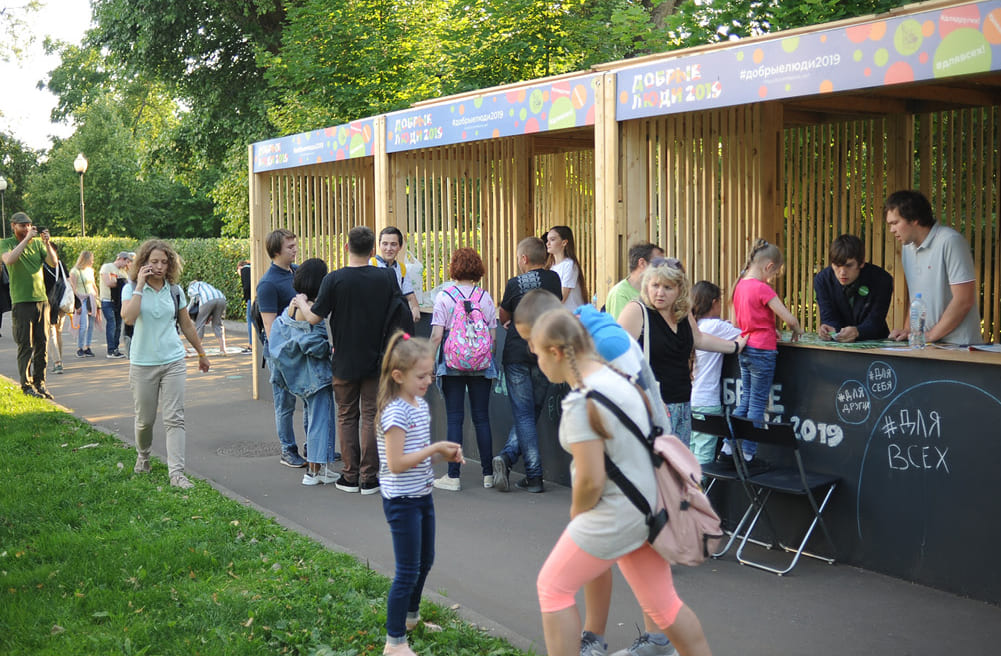
In 2019, the Civic Chamber enhanced anti-fraud activities in the field of charity and social advertising, initiating the development of a Memorandum of Cooperation in order to prevent the risks of fraud fundraising through disseminating social advertising. The need for its development is caused by repeated cases of fraudulent social advertising and other forms of social communication, which broadcast calls for the collection of private donations and which are either not exactly scammers or genuine scammers, or organizations. Also the Memorandum needs to reduce risks both for the mass media, which does not always understand that such messages can source from a scammer transmitting intentionally false information, and for citizens who respond to emotional calls and transfer their funds to scammers.
Important progress has been achieved in the field of social entrepreneurship. The July 26, 2019 was marked by the amendments to Federal Law No. 209-FZ80, which secured the concepts of “social entrepreneurship" and “social enterprise”. The law defines the conditions for classifying the activities of small and medium-sized enterprises (SMEs) as social entrepreneurship, reflecting the status of a social entrepreneur in a single register of SMEs, and also securing possible special forms and types of support for social entrepreneurship. There are four basic criteria for classifying enterprise as social: The SME subject gives employment for socially unprotected groups of citizens, ensures the sale of goods (work, services) produced by these citizens, itself produces goods (work, services) intended for such citizens, and/or carries out activities aimed at achieving socially useful goals and contributing to the solution of social problems of society.
Fields of activity of social entrepreneurs, %*
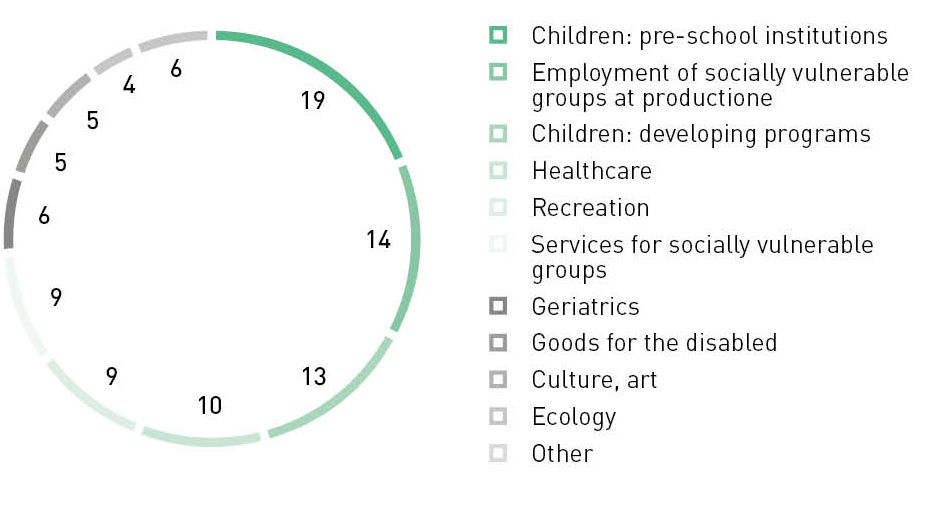
* According to the statistics of the All-Russian contest "Social Entrepreneur"
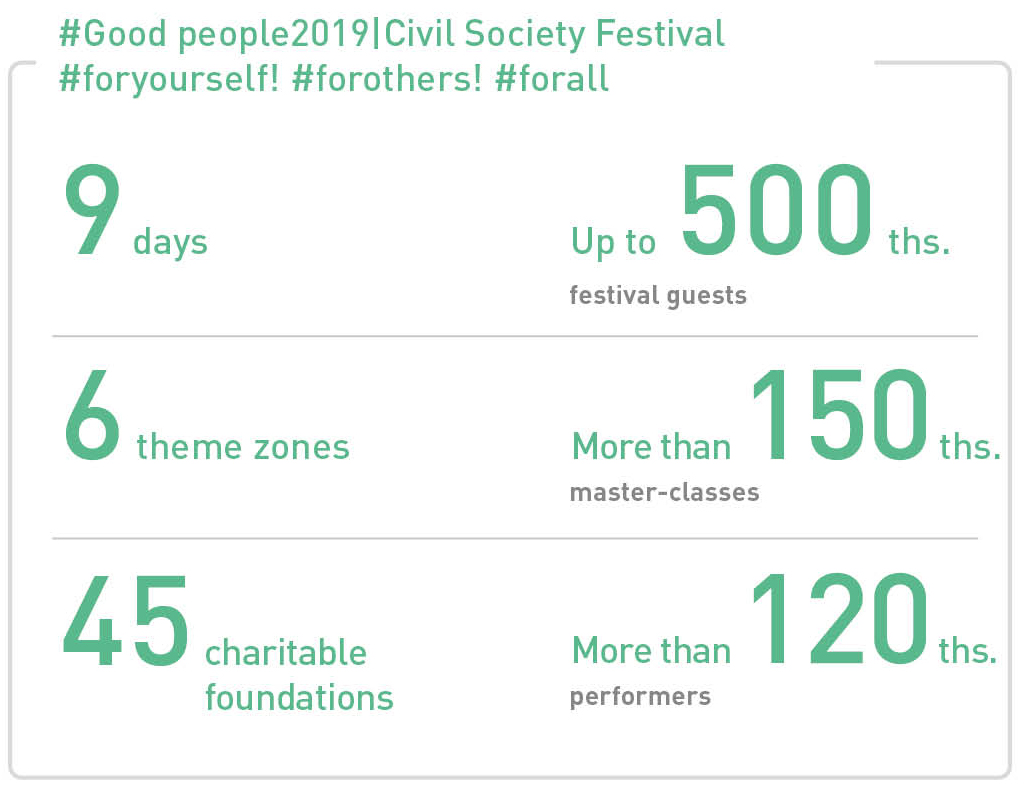
The Civic Chamber of the Russian Federation conducted a series of public expertise of the editions of bills at various stages of its development and approval; the main provisions were supported by public figures, and received individual recommendations. Almost all recommendations of the Civic Chamber are reflected after the adoption of the law.
The issues related to the development of social entrepreneurship are ranked high in the agenda of the Civic Chamber. The May 31, 2019 was marked by the All-Russian Forum “Social Entrepreneurship: Time to Act". The main initiative stated at the Forum is the need to create a unified communication and practice-oriented platform for social entrepreneurs. The development of social entrepreneurship was also discussed on special discussion platforms at the "Community" forum in Ulan-Ude on May 30 and at the final forum in Moscow on November 1, 2019.
The issues of development of social entrepreneurship and existing practices in the regions are regularly reviewed at all platforms of the "Community" forum dedicated to the progress of the system of rendering services in the social sphere. Within the project of the Civic Chamber of the Russian Federation #RegionNPO, the constituent entities of the Russian Federation, along with measures to support SO NPOs as providers of services in the social sphere, provide work on the development of social entrepreneurship.
The interest of people in the problems of charity and the development of civil society is shown by the festival "Good People" held by the Civic Chamber. The festival is the venue for the presentation of various projects implemented by charitable foundations, public associations and civil society activists, and states social problems and involves citizens to solve them. The festival is held annually in significant places of Moscow, highlighting the importance of civil society in the development of the country. The number of festival participants is growing year after year: If in 2017 the festival was attended by less than 7 thousand people, then in 2019, up to 500 thousand people became guests of the event held in the Gorky Park.
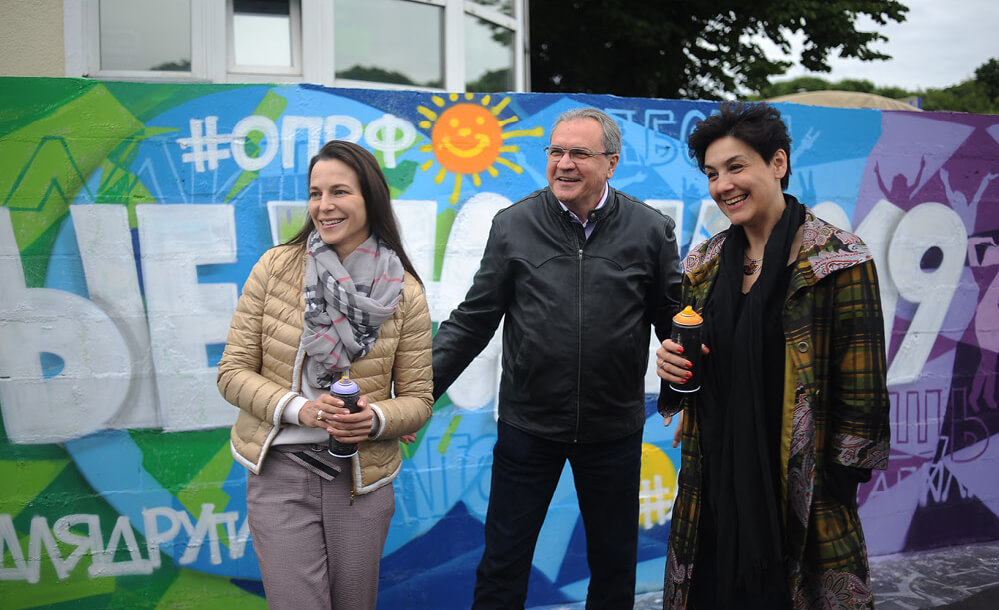
“Good people” is in partnership with the largest charitable foundations and public organizations; 45 charitable organizations took part in the fair of funds. The festival introduced the results of successful public projects that help solve critical social problems to residents and guests of the capital. The motto of the festival: “#foryourself! #forothers! #forall!”. Dozens of master classes and activities took place in six thematic zones. Products created in the creative studios of the festival were sent to care recipients of various social institutions in Russia. The fair of the festival "Good People" represented 45 charitable foundations. Everyone could become their volunteer or make any donation.
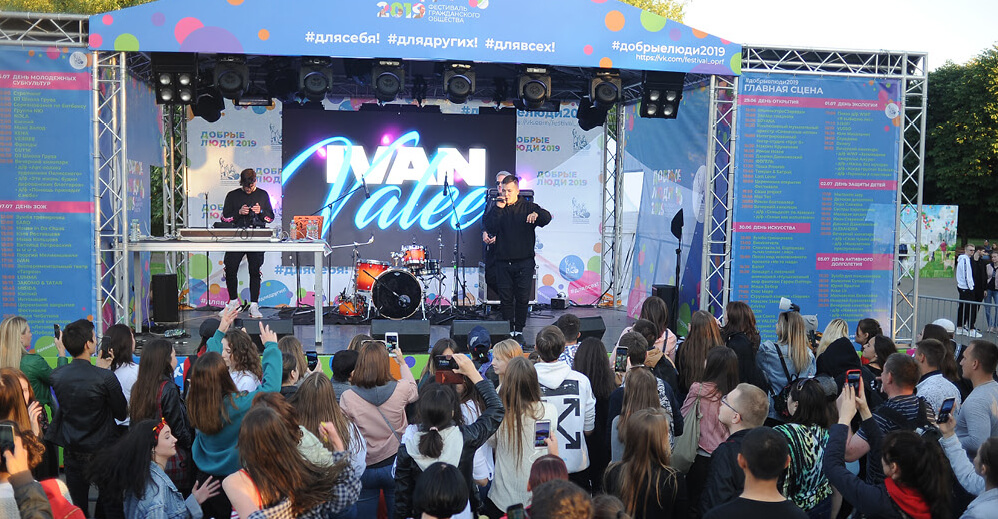
The importance of charity for the development of civil society can hardly be overestimated, because selfless assistance to others is a universal value for all civilizations, cultures and religions. Therefore, the Civic Chamber of the Russian Federation proposes to include the topic of charity and mercy in the schools curriculum.81 A good illustrative example can be found in St. Petersburg, where all schools of the city participate in the “White Flower” charity event, that involves “Lessons of Kindness” when elementary school students produce about 70 thousand white flowers in support of seriously ill peers. The Civic Chamber of the Russian Federation together with the Ministry of Science and Higher Education and the Ministry of Education will be able to systematize the experience of the regions and, following the results, prepare recommendations for schools on involving children in charity and community service.
#Non-profit sector as a new branch of socially responsible economy
The development of the non-profit sector in Russia in recent years has been marked by competing trends. The total number of non-profit organizations is decreasing, while the role of NPOs in the economy is gradually growing due to the expansion of the field of the NPOs' participation in services to the population of the social sphere.
According to the register of the Ministry of Justice of the Russian Federation, more than 218 thousand NPOs are registered in Russia (223 ths. in 2016). According to the regional civic chambers, the number of working, active NPOs does not exceed 15–20% of their total number. The Primorsky Territory has about 3,000 NPOs registered, of which about 250 are active, and really work.82 The Stavropol Territory has about 3,000 of registered NPOs of which about 90 organizations work on a permanent basis, including disabled and veteran associations, women's councils, monuments preservation society, and trade unions.83
The staff of the main part of NPOs does not exceed five people, but, for example, the largest NPO of the Primorsky Territory is the regional council of veterans that unites 38 cities and district organizations, about 700 primary organizations with a total number of over 450 thousand people. The regional organization of the All-Russian Society of Disabled Persons consists of about 25 thousand people. NPOs vary significantly in their areas of activity, namely including religious organizations, trade unions, and sports clubs. It is clear that the measures of state regulation and support of such various organizations should be different (as for commercial organizations). However, this approach comes in the practice of public administration slowly, which may impede the activities of single organizations. When adopting many regulatory acts relating to business entities, the features of NPOs are not taken into account, provided that many of them have a staff of 1-2 people and do not receive ongoing funding. For example, there is a legislative norm that the director of an NPO cannot be a volunteer. As a result, heads of small NPOs among pensioners automatically lose their status of non-working pensioners, the indexation of pensions stop, although they work for free in their NPOs and do not receive salaries. There are cases when pensioners pay themselves their own salaries, then deduct taxes in order not to violate the law. There is a need in a delicate adjustment of legislation that would take into account features of the non-profit sector and individual NPOs. The current law on non-profit organizations, adopted in 1996, with all amendments, turns into a kind of “patchwork quilt” and conflicts with the Civil Code of the Russian Federation. Obviously, today there is a need to develop new comprehensive legislation on the non-profit sector. Likewise, it is necessary to change approaches to the statistical recording of NPOs, taking into account information on the number of full-time employees and volunteers to the real areas of activity and financial indicators. The generalized data collected today say little about the situation and dynamics of the non-profit sector.
An important area in which the potential of civil society and NPOs can be involved is social services. In 2019, the Civic Chamber of the Russian Federation prepared a special report entitled “Participation of NPOs in Services of the Social Sphere”, which allowed to highlight both the achievements in this field in recent years and the barriers that stand in the way of further development of the sector.84
The advantages of NPOs are that they see specific problems of a person, are closer to people, often offer an individual approach and unique methods that are not available anywhere else. NPOs are not limited by branch and departmental affiliation, which allows them to respond quickly to changes in public life, respond more quickly to changes in demand, and new requests and needs of service recipients. There are spheres where it is simply impossible to achieve significant changes without involving non-profit organizations, e.g. prevention of socially dangerous diseases, introduction healthy lifestyle and physical education to citizens, assisted living and employment of persons with disabilities, organizing recreation for children with disabilities, etc.
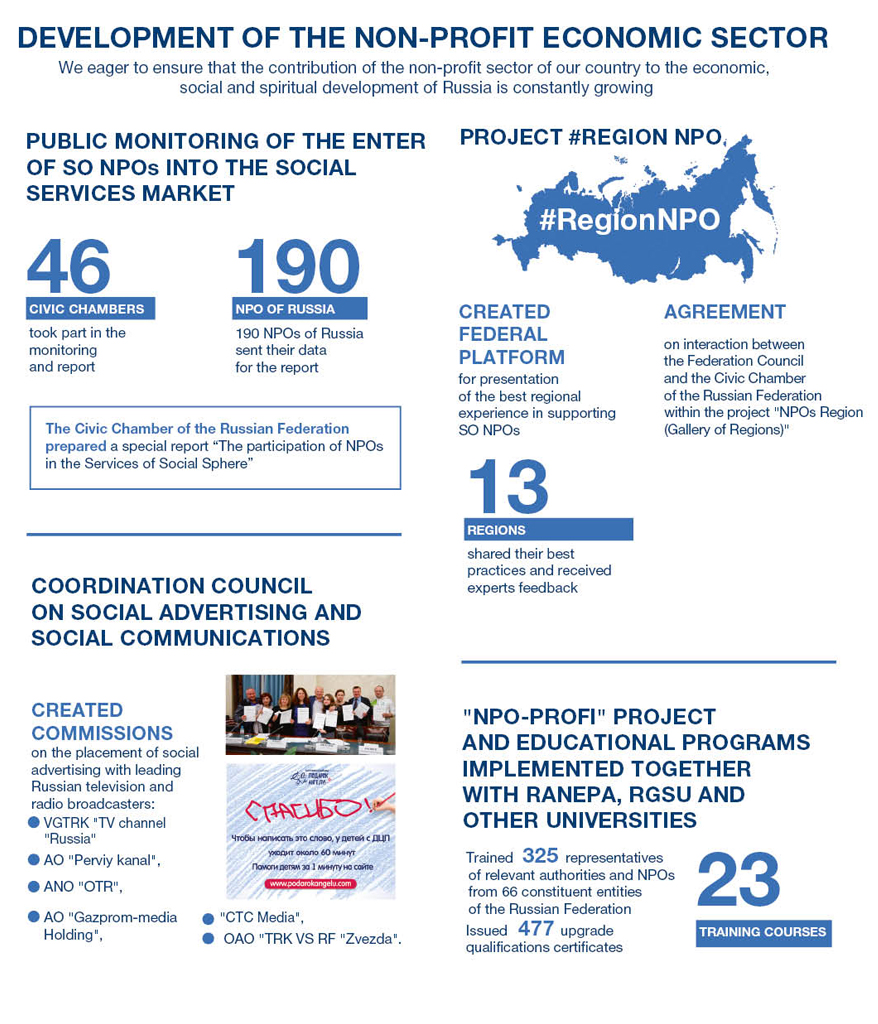
In Russia, the state has taken a course towards active involving of non-profit organizations in providing the population with social services at the budget expense. Federal Law No. 442-FZ85 laid the legal foundations for the implementation of social services by the SO NPOs, and secured the concepts of “social service”, “recipient of social services” and “social services provider”. Regions prepare registers of social service providers, and implement phased programs of accessing NPOs to budget funds for the provision of services to citizens in the social sphere.
In 2016, a set of measures was approved. It aimed at ensuring access of SO NPOs operating in the social sphere to budget funds allocated for the provision of social services to the population. Federal Law No. 44-FZ86 for SO NPOs establishes the benefits provided when procuring social services.
The state allocates significant funds to this area. At the beginning of 2019, 76 (72 in 2018) constituent entities of the Russian Federation fund SO NPOs in the social sphere; 66 constituent entities have such support at the municipal level. In 2018, more than 31 billion rubles (in 2017 – 24 billion) were transferred to support socially oriented non-profit organizations in 83 regions, the financing was distributed between 4.4 thousand SO NPOs, 22 mln received services. This funds were spent on social protection and social services, education, culture, healthcare, physical education and sports.
At the same time, these impressive figures do not fully reflect the development of the non-profit sector itself. In some cases, the providers of these services are NPOs reorganized from former budgetary institutions. For example, according to the Civic Chamber of the Trans-Baikal Territory, the majority of the region's organizations that received subsidies are state institutions that have changed the legal status of SO NPOs; the same practice exists in the Republic of Bashkortostan.
NPOs providers of social services are facing certain difficulties. One of the them is tariffs and reimbursement of expenses incurred by NPOs, which are often unreasonably low. Tariffs vary in different regions. In some cases, there are delays in payment and even non-payment. Many constituent entities of the Russian Federation have the amount of compensation that does not correspond to the complexity of services and does not correlate with the remuneration of employees providing services and they do not include administrative expenses. Reporting by NPOs on the provision of social services is more complicated and costly than for budgetary organizations for which this process is digitalized.
An equally difficult problem is the accurate and competent qualification of the service that NPOs provide. Sometimes the respective registers do not have many unique NPOs services, which means that they cannot demand to be provided at the expense of budget funds. Narrowly targeted small organizations that provide only a few services cannot be recorded into the register of social service providers. Large and diverse organizations are usually selectable. This deprives the possibility of competitive access and the use of the potential of NPOs in particular cases. Positive is the practice of individual constituent entities of the Russian Federation to adapt the regulatory framework in the field of social services to provide SO NPOs with a competitive access to the provision of social services. For example lists of social services have been updated in the Sakhalin and Tula Region.
The stable operation of SO NPOs in the provision of services is also significantly complicated by months-long delays in paying for the services rendered by them. This is due to the assessment of the required amount of funds from regional and municipal budgets for provisioning of services in the social sphere is carried out, as a rule, based on the data of the previous year taking into account the existing demand for services of state and municipal institutions. NPOs providing services using new technologies lead to an unpredictable growth in demand, which is not provided in budget planning.
Other institutional barriers preventing SO NPOs from provisioning social services are the following:
- lack of effectiveness of mechanisms of interinterinstitutional, interlevel and intersectoral interaction on the participation of SO NPOs in the provision of services in the social sphere;
- lack of mechanisms for regular review of existing lists of services and standards for services that are not provided by state (municipal) institutions;
- the imperfection of the tender procedures in the procurement of goods, works, services for state (municipal) needs (Federal Law No. 44 – FZ), which substantially complicates the participation of SO NPOs in such tenders;
- excessive reporting of SO NPOs for rendered services and lack of access by SO NPOs to information systems that simplify the submission of such reports.
According to the Civic Chamber, in order to increase the effectiveness of the participation of SO NPOs in the provision of social services, it is necessary:
- To ensure the formation of mechanisms for coordinating the activities of federal and regional authorities, local authorities on the development of the market of social services with the involvement of NPOs and civic chambers of various levels.
- To consider the need to empower sectoral federal authorities of the social sphere with additional administrative functions in the development of mechanisms for the participation of SO NPOs in the provision of services.
- To ensure methodological support on the part of specialized sectoral federal authorities for the activities of regional authorities on the development of the social services market, involvement of non-governmental organizations in their provision at the expense of the budget system of the Russian Federation.
- To develop methods for assessing the needs for services provided at the expense of budgetary funds, in the context of services and categories of recipients.
- To ensure regular review of existing lists of services, taking into account the occurrence of new services demanded by recipients of the services provided by SO NPOs.
- To develop guidelines for standardization and tariffing of services provided by SO NPOs and not provided by state (municipal) institutions.
THE TOTAL AMOUNT OF FUNDS TRANSFERRED BY CONSTITUENT ENTITIES OF THE RUSSIAN FEDERATION TO SO NPOs
The total amount of funds transferred by the constituent entities of the Russian Federation to SO NPOs for the provision of social services to the population in 2018 amounted to 31.3 billion rubles. This more than by 30% exceeded the results of 2017 (over 24 billion rubles). These funds were distributed between 4.4 thousand SO NPOs (growth by 7%), provided that, these services were used by more than 22 million people, which is 3.6 times more than in 2017.
The total amount of budget funds of the constituent entities of the Russian Federation actually transferred to SO NPOs the provision of social services
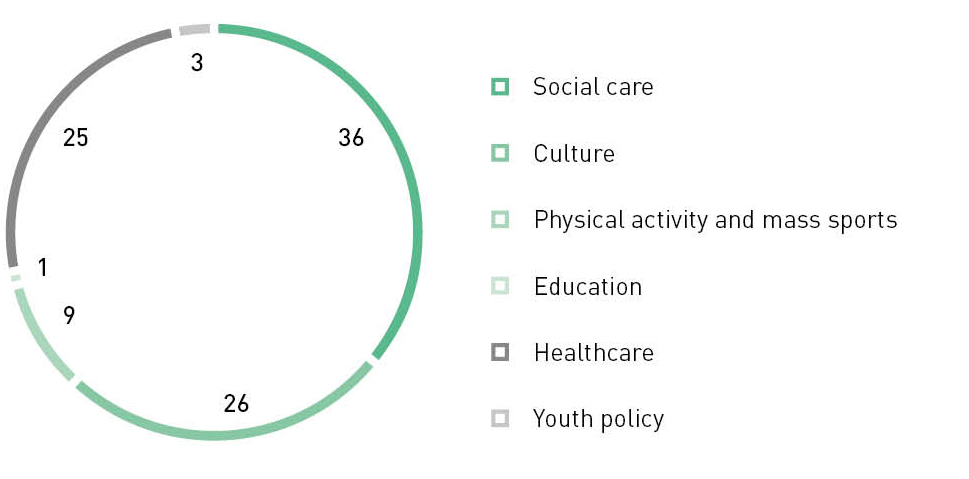
Information is given on 83 constituent entities, with the exception of the Ulyanovsk Region and the Republic of Khakassia.
Information on the total amount of funds transferred by the regions to SO NPOs for the provision of social services87
The results of the implementation of measures to ensure access by SO NPOs to the provision of services in the social sphere, in 2018, by branches
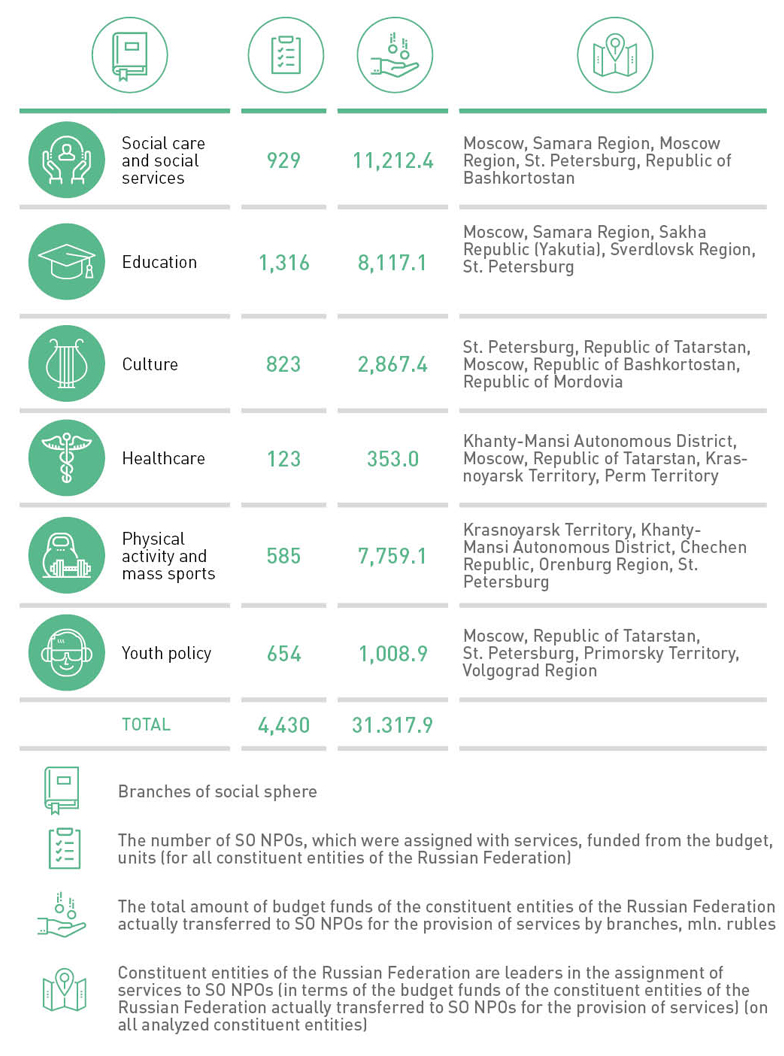
- To strengthen control of untimely transfers of funds from the budget system of the Russian Federation to NPOs as part of obligations and according to the concluded agreements on the provision of subsidies.
- To urge federal and regional authorities ensure digitalization of interaction with NPOs that provide services in the social sphere, and the possibility of submitting digital reports using the Internet.
- To promote the development of the competencies of employees of SO NPOs involved in the provision of services in the social sphere, including by providing them with free access to continuing education programs for employees of state (municipal) institutions.
- To consider changing of the methodology for preparing by the regions a report on the implementation of measures to ensure access by SO NPOs to the provision of services in the social sphere, where delineate services and work.
- To raise the public awareness of the implementation of national projects, as well as to ensure openness and accessibility of information on the possibilities and ways of NPOs participation; on the ongoing competitions for the provision of subsidies (grants), participation conditions, results and winners of competitive selections.
The constituent entities of the Russian Federation independently develop and implement mechanisms for attracting non-governmental organizations to the provision of services in the social sphere. However, there is a need for a single legislative act at the federal level that would ensure legal regulation of existing practices, the rules for the use of budget funds and guarantee a uniform law enforcement practice.
To this end, the Ministry of Finance of the Russian Federation has prepared a bill “On the State (Municipal) Social Order for the Provision of State (Municipal) Services in the Social Sphere”, which allows solving a number of problems. Firstly, this is the introduction of the concept of “state (municipal) social order” (the volume and quality of state-guaranteed social services free for citizens). Secondly, the obligation of the executive authorities to determine annually the volume of the state (municipal) social order for specific services and the method of its implementation. Thirdly, the document guarantees the conditions for competitive access of state and non-state organizations to the performance of state social orders. Fourth, the bill defines the obligations and responsibilities of executive authorities and service providers.
On January 1, 2017, the Law on Non-Profit Organizations – Contractors of Publicly Useful Services came into force.88 Its main meaning is that those NPOs that provide socially useful services of appropriate quality may be granted the right to receive priority state support and access to budget funds. The register of SO NPOs – contractors of publicly useful services has been maintained by the Ministry of Justice of Russia since January 1, 2017. Currently, it includes information on 341 organizations. Since January 1, 2019, 29 organizations have been excluded from the register. Since 2018, the executive bodies of the constituent entities of the Russian Federation have been empowered to evaluate the quality of services rendered by SO NPOs, and the territorial bodies of the Ministry of Justice of Russia in the constituent entities of the Russian Federation have been empowered to make the final decision. In 2019, the procedure to receive by NPOs a status of providers of socially useful services was facilitated, however, it still remains laborious, as NPOs often do not have a clear idea of what information should be submitted to authorities in order to confirm the quality of the service.89
There are still difficulties that appear both before the SO NPOs, which are faced with the task of proving their integrity and substantiating the quality of SUSs (socially useful services), and before the authorities evaluating these services. In particular, a prerequisite for an NPO to acquire a status of SUSs contractor is to obtain a conclusion on the compliance of the quality of the provision of the SUSs with the established quality criteria in authorized federal and regional executive bodies. In practice, there is an application variability in hands of authorities evaluating services of criteria for assessing the quality of socially useful services.
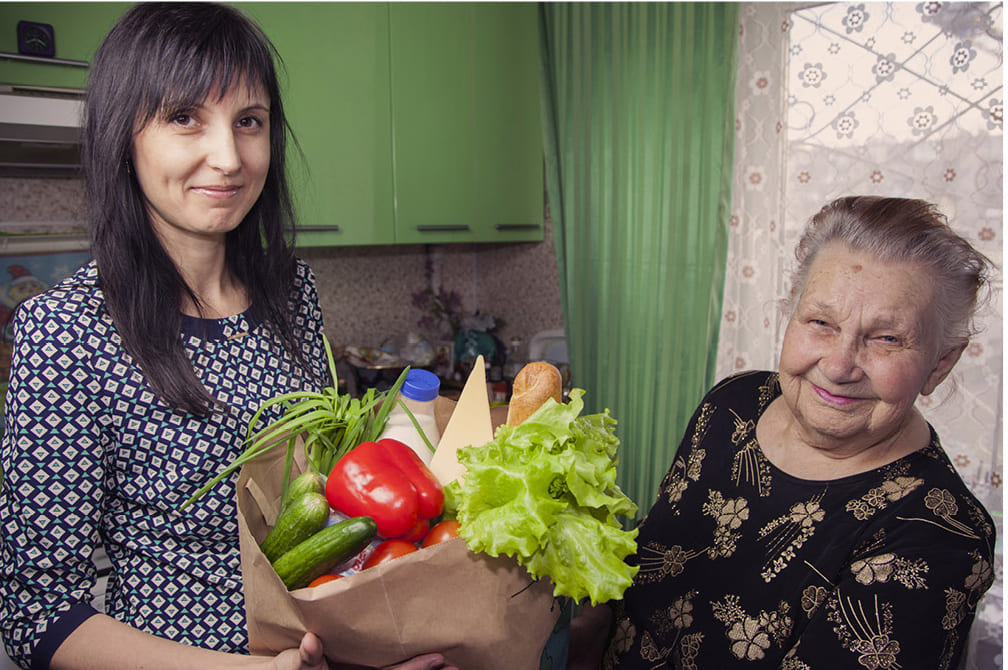
In 2019, the Ministry of Justice of Russia developed a bill “On Amendments to the Federal Law 'On Non-Profit Organizations' in Terms of Improving the Procedure for Including a Socially Oriented Non-Profit Organizations in the Register of Non-Profit Organizations Performing Socially Useful Services”. The bill proposes to simplify the current procedure for acquiring the status of an SUSs contractor for those SO NPOs that have implemented properly the project using a grant from the President of the Russian Federation provided for the development of civil society. Based on the results of a public expertise at the Civic Chamber, the concept of the bill was supported; submitted proposals to eliminate the uncertainty of its specific provisions regarding the procedure and criteria for evaluating the results of the implementation of SO NPOs projects using a grant from the President of the Russian Federation in order to assign them the status of an contractor of publicly useful services. On October 21, 2019, the bill was sent by the Government of the Russian Federation to the State Duma of the Federal Assembly of the Russian Federation.
The version of the bill sent to the State Duma of the Federal Assembly of the Russian Federation did not contain comments and suggestions from the conclusion of the Civic Chamber.
The main problem remains the uncertainty of preferences that gives NPOs the status of a contractor of socially useful services, the lack of clear systemic mechanisms of benefits for SO NPOs - contractors of SUSs. As a result, many NPOs question the practicability of applying for a status, given the complexity and imperfection of the procedure for recognizing NPOs as contractors of SUSs, which are associated with the insignificance of specific preferences for organizations with such status.
A number of regions, adopted legal acts that provide SO NPOs – contractor of SUSs with subsidies from the regional budgets. For example in the Moscow Region, such organizations can receive support for activities in the field of social protection and employment, the Saratov Region has a regulatory rule on the provision of subsidies from the regional budget to SO NPOs – contractor of healthcare SUSs. The Chuvash Republic subsidize SO NPOs having a status of SUSs contractors from the republican budget, if they carry out activities in two directions – healthcare and free legal assistance.
SO NPOs as social services providers can and should play an important role in the implementation of national projects. At the same time, their involvement in this work in one form or another is expressly indicated only in 5 out of 12 national projects – “Demography”, “Education”, “Housing and Urban Environment”, “Ecology”, and “Culture”. The passports of projects which include the federal ones do not contain specific proposals on the format for participation of SO NPOs in achieving national goals.
SO NPOs are actively engaged in the implementation of the NP "Culture". Specifically, 43 regions have already involved SO NPOs in the implementation of certain areas of regional projects “Creating the Conditions for Implementing the Creative Potential of the Nation” (“Creative People”), and provide them with subsidies and grants from regional budgets on a competitive basis. This year, 19 SO NPOs received subsidies for the implementation of certain areas of the national project following the competitive selection organized by the Ministry of Education of Russia and the Federal Youth Agency. At the same time, in the implementation of the NP "Healthcare", "Science" and "Ecology", has an insignificant participation of SO NPOs.
The issue of access of socially oriented organizations to the state and social order during socially significant events requires a particular attention. Such events are created for the public good, they do not require income, tickets for such events are free. And since this is a public good, then why the law identifies the price of the contract?90 There is a need in amendments to the law by establishing that the priority for fulfilling the tasks of conducting socially significant events is applications from socially oriented organizations. The main selection criteria for applications for such events should be criteria that are characterized as non-cost evaluation criteria, including: qualifications, goodwill, similar experience of successful procurement of services of a comparable nature and scope.
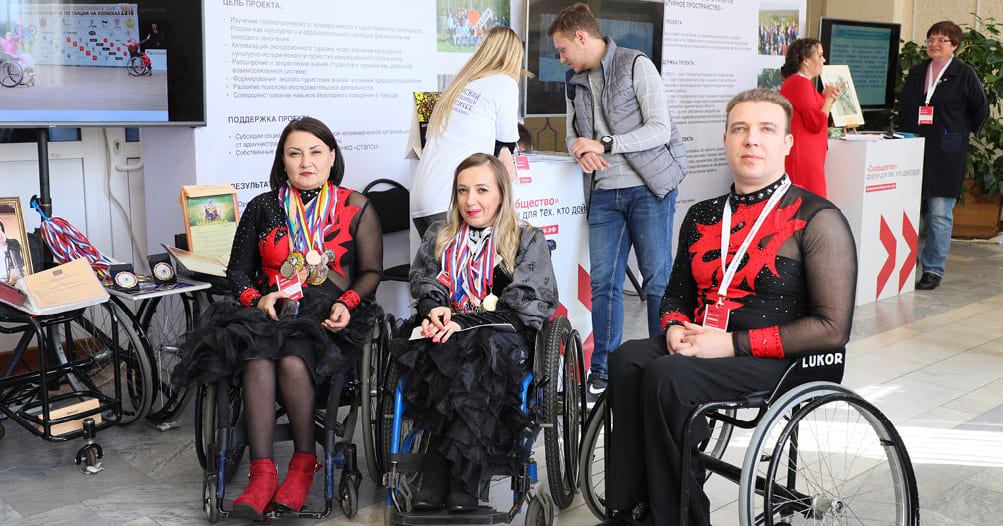
Since 2018, to draw attention to the best practices of non-profit organizations, the Civic Chamber of the Russian Federation has been implementing the project #RegionNPO, in the framework of which non-profit organizations and the business community provisioning social services have been representing. On June 19, the III Forum of Social Innovations of the Regions evidenced a conclusion of the Agreement On Interaction between the Council for the Development of Social Innovations of the Constituent Entities of the Russian Federation under the Council of the Federation of the Federal Assembly of the Russian Federation and the Civic Chamber of the Russian Federation in the Framework of the Project #RegionNPO (“Gallery of Regions”). The Agreement envisages the creation of a federal presentation platform for sharing experience and practice in supporting socially oriented NPOs, their involvement in the development of social services, the introduction of innovative social technologies, the distribution of information on the best practices and their promotion.91
An important partner of NPOs in the regions are universities as centers of expertise and competencies. The so-called “third mission” of the university involves the shift from the image of a closed corporation to active interaction with authorities, NPOs and civil society activists. Such interaction often gives a positive result. Universities can become a platform for advanced training of NPOs staff, as well as the main resource for attracting volunteers. For its part, NPOs provide their own platform and student internships.
Recent years have demonstrated an active development of educational programs on the topics of civil society and the non-profit sector.
If at the beginning of 2019, 19 constituent entities of the Russian Federation (25 universities) have been implementing 43 educational programs on the subject of NPOs, then today their number has increased to 66. Moreover, 24 constituent entities of the Russian Federation (37 universities) have been implementing 69 programs of extended education.92 The Law On Free Legal Aid regulates, among other things, the participation of universities in the free support of vulnerable groups of the population. Consideration should be given to develop at the legislative level the tools of implementing the same approach to support SO NPOs and socially responsible business. In this regard, it is worth to mention the experience of the Yaroslavl Region, where the formation of the NPOs resource center took place at the platform of the regional university; NPOs resource support centers were also created on the basis of the South Russian Institute of Management (a branch of the RANEPA (YURIU RANEPA)), Kursk State University, Kazan (Privolzhsky) Federal University, and Lipetsk State Pedagogical University named after P.P. Semenov-Tyan-Shansky.
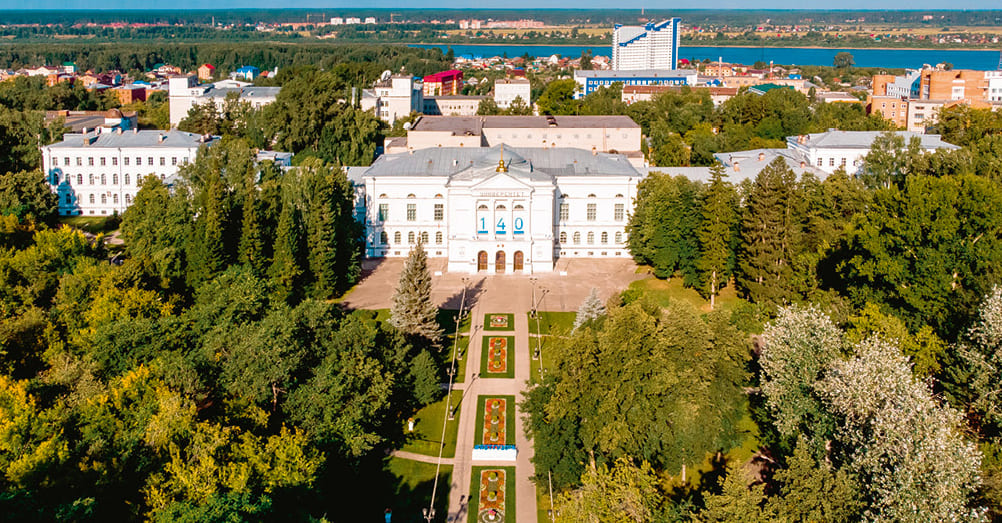
#Government support of non-profit sector
Recent years have been marked by an increase in state support of the third sector. The main form of state support for socially oriented NPOs is budget subsidies (grants). During 2017–2018, the Presidential Grants Fund organized four contests for the provision of grants of the President of the Russian Federation for the development of civil society, in which 16,814 NPOs took part. In total there were 19,414 applications for the implementation of 35,184 socially significant projects, 6,786 projects were supported for a total amount of 14.5 billion rubles. The number of regional NPOs is 87% of the total number of applications.93
In 2019, the Presidential Grants Fund received 8 billion rubles from the federal budget for the provision of NPOs with grants.94 In 2019, the fund received more than 27 thousand applications, including 2,443 NPOs submitted applications for the first time. The most active region in terms of the number of submitted projects, excluding Moscow and St. Petersburg, was the Republic of Bashkortostan – 386 submitted projects. Second place went to Volgograd Region with 378 projects submitted, and third place goes to Belgorod Region, which sent 349 initiatives. And again the most popular grant direction among the contest participants was “Protecting the health of citizens, promoting a healthy lifestyle” – 17% of projects. Second place – “Preservation of historical memory” with 15% of projects. Third place – “Support for science and education” with 15% of projects.95
Competitions for NPOs are held by federal agencies. For example, the Ministry of Education of the Russian Federation provides grants to create conditions for the early development of preschool children, to implement a program of psychological, pedagogical, methodological and advisory assistance to parents of children who receiving preschool education in the family. The competition is a part of the project “State support of non-profit organizations for the provision of psychological, pedagogical, methodological and advisory assistance to citizens with children”, which is a part of the federal project “Support for families with children” and the national project “Education”.96 The grant competition of the Ministry of Sports of the Russian Federation is intended for non-profit organizations implementing projects in the field of physical education, mass sports and sports reservs.97 The Ministry of Culture of Russia allocates 300 million rubles annually to support the creative projects of NPOs aimed at strengthening civic identity based on spiritual, moral and cultural values of the peoples of Russia, popularizing the Russian language and literature, folk crafts.
Executive bodies of the constituent entities of the Russian Federation and local self-governments also provide NPOs with financial support. Some regions sent a significant support for NPOs. For example, in 2016-2018 the Volgograd Region allocated from its budget 900 million rubles to support non-profit organizations.98 The Arkhangelsk Region, developed a uniform form for applications of civil initiatives project, which is unified with the application of the Presidential Grants Fund. This year it is planned to launch an online platform for submitting applications for regional grant competitions through the website of socially oriented NPOs of the Arkhangelsk Region.99 Since 2019, St. Petersburg provides grants advances for NPOs.100 Since 2019, the Khanty-Mansiysk Autonomous District, launched a unified system of supporting SO NPOs implementing socially significant projects, i.e. a grant from the Governor of the Autonomous District, which is created similarly with the granting system of the President of the Russian Federation for the development of civil society.
The general tendency is to increase funding for NPOs both through presidential grants and from regional budgets. And at the same time, the structure of budget support for NPOs varies from region to region. For example, in 2018, the Penza Region, in terms of a part of a regional competition, provided 74 NPOs with subsidies in the amount of 9.5 million rubles. And at the same time, regional NPOs received subsidies through presidential grants of 31 million rubles. In 2018 the Primorsky Territory, received 146 applications for the presidential grant competition, of which 46 received support in the amount of 90 million rubles. In recent years regional subsidies were within the range of 5 million, but in 2019, 65 million were allocated to the regional competition, while only 81 applications were submitted for the competition.101
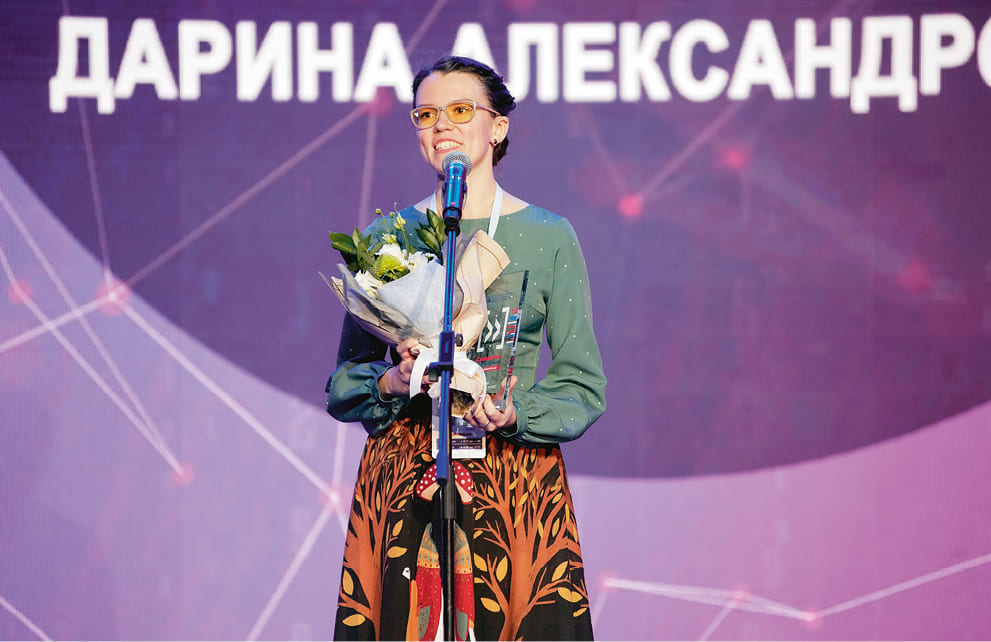
In 2017 and 2018 the Stavropol Territory allocated from the regional budget subsidies for supporting SO NPOs in the amount about 40 million rubles, and in 2019 about 80 million rubles. In 2018, as part of the presidential grants, the winners were 14 organizations from Stavropol, which received about 32 million rubles.102 The Ulyanovsk Region launches a competitive selection among SO NPOs for the provision of subsidies from the regional budget, e.g. in 2018 12 million rubles allocated, and subsidies for the NPOs within the presidential grants amounted to about 32 million rubles.103
The things are different in the Yamalo-Nenets Autonomous District, where in 2019, 115 organizations received support in the amount of 131 million rubles, namely the regional budget allocated 77 million rubles, and the municipal budget allocated 54 million rubles, consequently. At the same time, in 2018, only 4 NPOs with funding of about 4 million became winners in the presidential grant competition, despite 130 submitted applications.104
In many regions, subsidies for supporting NPOs are also allocated from municipal (primarily city) budgets. Since 2015, the Ulyanovsk Region, launches competitions in all municipalities for the allocation of subsidies to SO NPOs. In 2017–2018, the total annual amount of funds for tenders amounted to about 6 million rubles. The administration of each municipality of the Ulyanovsk Region, has a specialist to work with the non-profit sector. Some regions have special awards for NPOs and public figures. For example, such prize is awarded annually in the Republic of Tatarstan. 5 prizes from 250 thousand to 400 thousand rubles each were awarded in 2018.105
As a rule, the pool of winners of regional competitions for NPOs includes approximately the same set of organizations, since the total number of active NPOs participating in competitions is very small.
The materials of the Civic Chamber of the Stavropol Territory read that traditionally the regional support from the Stavropol Territory is received by council of veterans, antidrug groups of public organizations, disabilities associations, and a number of creative, environmental, cossacks and patriotic nonprofit organizations.106
In some regions, the involvement of NPOs in the provision of public services and the implementation of national projects is systematic. The Volgograd Region, within the framework of the regional project “The Older Generation”, and with the participation of specialized NPOs, creates a system of long-term care for elderly citizens and persons with disabilities. To date, 9 SO NPOs are participating in the creation of the LTCSs (long-term care systems), namely 8 SO NPOs providing socially useful services at home, and one SO NPO providing stationary services. NPOs of the Volgograd Region take part in the organization of temporary employment of minor citizens aged 14 to 18 during their free time. NPOs conclude an agreement with the employment center and receive subsidies from the regional budget for the payment of labor of minors employed for temporary work. In January – August 2019, 25 NPOs employed about 500 minors for temporary works. A financial support was provided from the regional budget in the form of subsidies in the amount of more than 2 million rubles for salaries of minors.107
Along with grant competitions, the main form of supporting the NPOs is financing of the current activities of organizations. NPOs employees and civil society activists who took part in the survey within the "Community" forums are closely divided in answering the question of which of these forms of support should be a priority.
What form of government support for the NPOs sector should be a priority?
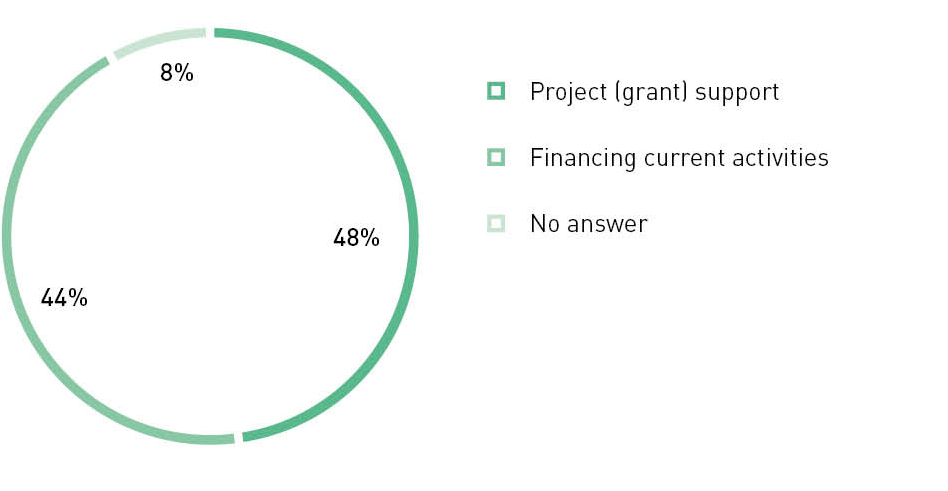
Source: The Civic Chamber of the Russian Federation108
The state’s attention to the development of NPOs is obviously reflected in the change of the perception of the general situation with the third sector in this country. Thus, the vast majority of participants in the "Community" forums (NPOs employees and civil society activists) agreed that in recent years the conditions for the activities of NPOs in Russia have improved in general.
Conditions for NPOs activities in Russia over the past 5 years:
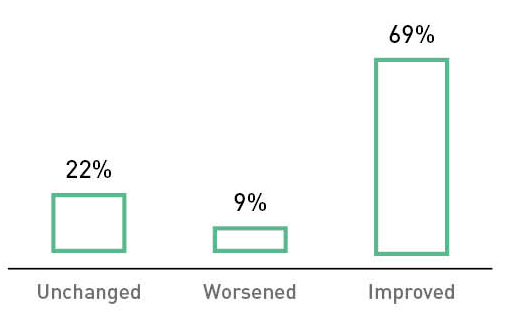
Source: The Civic Chamber of the Russian Federation109
The experience gained by the Civic Chamber of the Russian Federation in interacting with civil society activists during the preparation of a special report on the access of SO NPOs to the social services market led to the idea of the need to develop and implement a methodology for creating a rating of regions according to the level and quality of development of the non-profit sector. The Chamber devotes its work in 2020 to the development of this project. The Civic Chamber of the Russian Federation considers this work not only as an instrument of an objective diagnostic of the quality development of the non-profit sector in the regions, but also as a factor of “soft power” that will allow influencing the policy of regional authorities regarding a support of NPOs.
